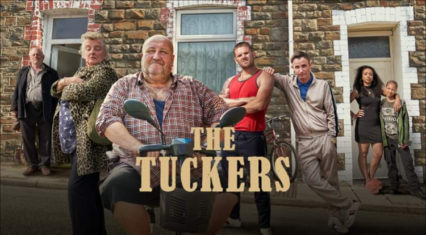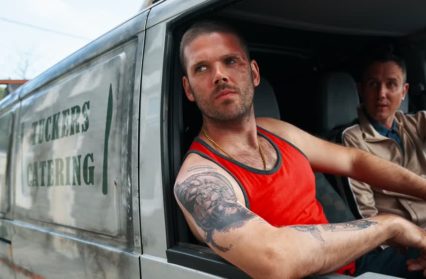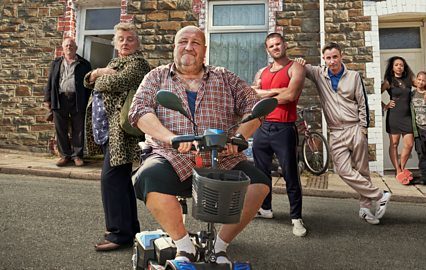Gareth Kent reviews BBC valleys based comedy, The Tuckers, starring and written by Steve Speirs, and directed by Ian Fitzgibbon.

The Tuckers is best described as a picaresque comedy centred around the exploits of a roguish yet lovable family located in a small Welsh valleys town. Its central character, Glyn Tucker (Steve Speirs), is a single father that lives with his mother Peggy (Lynn Hunter) and avoids work by claiming false incapacity benefit. His sons, Bobby (Ben McGregor) and Billy (Joshua McCord) are the family’s main breadwinners – albeit with mixed results – though this too is through a mixture of mischievous escapades that range from shady deals to bare-knuckle boxing, all the while branding themselves a ‘catering service’. Meanwhile, Bobby’s ex-partner, Natalia (Alexandria Riley) – who, as Bobby is often quick to remind us, is still his wife – lives next door with their daughter, Shakira (Hope Reynolds).
While each of the six episodes making up the first season is sparse when it comes to its overarching narrative, the central premise revolves around Bobby and Natalia’s failed marriage. Together with Bobby’s futile attempts to rekindle this relationship, there is conflict through the prospect of Natalia’s on and off again – alleged “Italian” – boyfriend, Roberto (Francois Pandolfo), moving in with her. This makes for some intriguing drama, although, it remains relatively light and comic for the most part. Nor does The Tuckers throw any real curveballs when it comes to its plot, and each story beat will be heard long in advance, as if practically yelling at the viewer, with the twist of the final episode being apparent several episodes prior. Evidently, The Tuckers do not seek to revolutionise television storytelling or anything remotely as grand, and viewers have seen everything it has to offer before even watching. It is a light comedy intended to make you relax, laugh, and care for its charming cast of characters. Indeed, despite them being embroiled in shady dealings and questionable life choices, I did find myself caring for the Tuckers family.
Of course, as The Tuckers is a comedy, the obvious concern for viewers is regarding the quality of its jokes. While I personally found none of its jokes truly hilarious, several did warrant a chuckle. Glyn’s idleness is the butt of most jokes throughout the series, particularly a humorous ongoing visual joke that sees Glyn travel next door via mobility scooter. The excellent use of framing here elevates the show’s jokes a great deal and is undoubtedly one of The Tuckers’ strong points. The visual absurdity is characteristic of the show’s general style. For example, in the first episode, Glyn unsuccessfully undertakes an investigation to uncover the culprit that has been stealing the wind mirrors from his mobility scooter. This investigation ultimately leads him to falsely accusing a one-legged 82-year-old-man, Dai ‘up and down’ (Alan David) – who is soon revealed to be Peggy’s secret lover – which, in turn, culminates with the one-legged man seeking revenge on Glyn who, in turn, escapes via mobility scooter.

Despite some of its memorable characters, however, it is a shame to say that The Tuckers will frequently debase itself through stereotyping. The show itself rarely acts as a vehicle for social commentary other than a minor instance that sees Glyn bemoan the lack of opportunities in the valleys. Nevertheless, this is short-lived and viewers are best advised not to interpret this scene as an example of social commentary. Indeed, rather than sincerely tackling any societal issues such as increasingly limited opportunities, the show opts to invert this moment into an example of Glyn’s laziness instead. Social commentary is, of course, not a prerequisite for comedy nor is it required, however, a perceived implication of this particular joke is an unpleasant one. As The Tuckers is fronted by an all Welsh cast and is intended for a Welsh audience, it is evident that its approach was intended to be understood as the show laughing along with the audience at a cast of characters we may all be familiar with at one juncture or another. Yet, the series as a whole tries a little too hard to denigrate the culture it seems to be trying to celebrate, at times relying too eagerly on both valleys and working-class stereotypes as the centrepiece of its jokes.
Overall, The Tuckers is at times an enjoyable watch, but its over-reliance on clichés and stereotypes will certainly prevent it from connecting with its audience. The Tuckers offer a moment of clarity in the season finale where Natalia addresses Roberto’s pompous chastising of the people of the valleys, stating: “This is my home. My people. My valley. And you think you’re better than all of this”. In isolation, this is a pleasant moment that characterises what I believe to be the show’s intent, of celebrating its valleys community. The moment is uniformly short-lived, however, as the camera quickly pans to a drunken couple who are getting a little too free-spirited next to Natalia, interrupting the frame as if there was a mandate to downplay any showing of valleys pride.
The Tuckers is available to watch now on BBC One and BBC IPlayer (Take note of TV licence charges).
Gareth Kent is a regular contributor to Wales Arts Review.



 Enjoyed this article? Support our writers directly by buying them a coffee and clicking this link.
Enjoyed this article? Support our writers directly by buying them a coffee and clicking this link.








